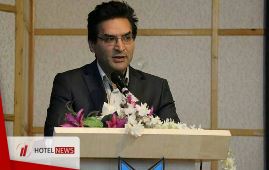
The head of the Azad University of Ardebil, referring to the step-by-step plans of establishment of a hotel school, said: "With the aim of developing the tourism industry and supporting the hospitality sector, the initiated the launch of a hotel school here." "We hope that with the coordination of the Cultural Heritage, Handicrafts and Tourism organization, we will be able to begin modern training in hospitality industry" he said. The head of the Islamic Azad University of Ardabil Branch continued to consult with several international institutes to participate in the definition of training courses of this hotel school and said: “Training courses will be held with the participation of these institutions and will be welcomed by hospitality managers, directors and hotel owners, we hope. He emphasized that the Azad University hope that with the investments made up to now, the development of hospitality and effective training in this area will be possible and available.
Create: Dec 17, 2018 Edit: Dec 17, 2018 Regional News
Hotelchamp, an Amsterdam-based startup has introduced a new technology called Autopilot. This new technology is set to revolutionize the way hotels think about their online guest experience. It is an AI (Artificial Intelligence) engine, which is trained to recognize and personalize the experience of visitors to a hotel’s website. Kristian Valk, the founder, and CEO of the Dutch startup Hotelchamp states that hotel websites provide a static experience for the visitors. This is bizarre given the different guests who visit these sites and their varied preferences. This is what the startup intends to change with the introduction of Autopilot. Without further ado, let’s see how Hotelchap aims to take over Booking.com and Expedia with its new AI feature. Hotelchamp intends to help hoteliers by providing a better experience to the guests. It is aimed at scaling up quickly and growing at a hyper-fast pace. Enhancing the experience of the guests comes with personalization. In fact, personalization is something that guests expect from hotels and it is a challenge to deliver that on a website in a meaningful way, claimed Valk. This is where AI comes to the picture. Artificial Intelligence can deliver a truly adaptive website experience, which is customized to every single visitor. It brings the right information or interaction to the right person at the right time, he added. The newly launched Autopilot is more than a chatbot. It customizes the static hotel websites by deploying a range of marketing techniques and tools. As it is seamlessly integrated, it offers a more lively, responsive and personalized experience. Furthermore, it guides guests throughout the direct booking process based on their requirements. Hotelchamp’s data science team has used their years of data and millions of A/B test impressions on developing Autopilot. They have used all these data to know what convinces guests to book directly. The new technology applies this knowledge against factors such as real-time data from the hotel’s website, best practices from thousands of hotels and GDPR-compliant visitor insights as well as behavior. Hoteliers just have to activate Autopilot with a single switch and the rest is assured.
Create: Dec 11, 2018 Edit: Dec 12, 2018 International News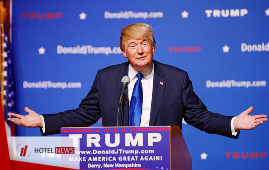
A lobbying firm backed by Saudi Arabia booked hundreds of rooms at the Trump International Hotel in Washington shortly after the 2016 election, The Washington Post reported Wednesday. The firm, Qorvis/MSLGroup, "has long represented the Saudi government in the United States," according to the Post. The group booked nearly 500 nights at the hotel to house US military veterans who were invited to DC to lobby against a law the Saudis opposed, the Post said, citing veterans and organizers of the trips. "In all, the lobbyists spent more than $270,000 to house six groups of visiting veterans at the Trump hotel, which Trump still owns," the paper said. Although the bill for the rooms was footed by the Saudis, only American veterans stayed in them during trips in December 2016 and January and February 2017, according to the paper. The Post reported that veterans were recruited to lobby lawmakers against the Justice Against Sponsors of Terrorism Act, which "opened the door to costly litigation alleging that the Saudi government bore some blame" for the September 11, 2001, terrorist attacks. Some of the veterans, according to the paper, didn't know they were staying in rooms paid for by the Saudis. "It made all the sense in the world, when we found out that the Saudis had paid for it," Henry Garcia, a Navy veteran from Texas who went on several of the trips, told the paper. During previous trips, the firm had booked rooms at a hotel in Virginia, the Post reported. But lobbyists, according to the paper, said they decided to stay at the Trump-branded hotel because of its room availability and discounts it had at the time; the goal was not to patronize one of President Donald Trump's hotels. Citing financial records, the Post said that on average, rooms at the hotel went for $768 a night around the time of the visits. A representative from the hotel declined CNN's request for comment, and the Saudi Embassy in Washington and Qorvis/MSLGroup did not immediately respond to CNN's requests for comment. CNN previously reported on two lawsuits by DC and Maryland that claim Trump is in violation of the Constitution's ban on emoluments -- payments from foreign or domestic government entities to the president -- because of his continued interest in the Trump International Hotel. The Post reported that the payments by the Saudis have become "ammunition" in the suits. DC and Maryland have said the Trump International Hotel's operations put other nearby hotels and entertainment properties at a competitive disadvantage and that the Trump hotel got special tax concessions. The hotel won its lease on federally owned property in 2013, well before Trump's election. On Wednesday, subpoenas served to the Trump Organization and a dozen related business entities by the attorneys general of the District of Columbia and Maryland included demands for tax documents, which, if obtained, could begin to fill out a picture of the President's finances by providing information about his main income sources.
Create: Dec 9, 2018 Edit: Dec 9, 2018 International News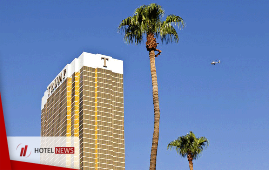
On August 14, 2015, back when the American presidency was just a twinkle in his beady eye, then candidate Donald Trump put his name to an agreement of a different order to that he has become accustomed to signing in the White House – the development of Trump International Hotel and Tower Bali, in collaboration with Indonesian investor Hary Tanoesoedibjo’s MNC Group. Like many projects bearing the Trump name, the resort, billed to become the largest on the island and the Trump Hotel Collection’s first property in Asia, has met with resistance. Are Chinese tourists ‘cheapening’ Bali’s image? The “six-star” resort and 18-hole golf course will occupy a cliff-top site previously home to the Pan Pacific Nirwana Bali, which boasts sweeping views across the Indian Ocean and one of Bali’s most important temples, Tanah Lot. The original plot’s 103 hectares did not suffice, so MNC approached local landowners with the intention of expanding the development. A documentary produced by the Australian Broadcasting Company, which aired in July 2017, claimed that most were reluctant to sell their land; some emphatically refused to do so. Still, that seemed of little import, MNC insisting in a statement, “Our land acquisition process has not encountered any problems or issues beyond the regular negotiations when dealing with land owners in Bali.” Judging by the group’s website, which describes a 108-hectare development (an increase of just five hectares), it would appear that those “regular negotiations” proved far from fruitful. However, that wasn’t the only hurdle. There are also concerns that the resort will overshadow nearby Tanah Lot, both literally and figuratively. Balinese custom dictates that no building should exceed the height of the tallest coconut tree for fear of angering the gods, and while there is no evidence to suggest that Trump International Hotel and Tower Bali will surpass such a height, its name and association with a US president known for ostentation rather than restraint suggest otherwise. And then there is the environmental impact of a major building project on an island that already struggles to balance tourism with sustainability. In a November 2 article, German news outlet Deutsche Welle argued that Bali’s rice terraces and subak irrigation system, which dates back to the 9th century, were under threat because of the demands of the tourism industry. It cited a 2012 study published in the Annals of Tourism Research, which found that more than half of the island’s groundwater supply was used by tourism, leading to water inequality and social and environmental problems that would affect Bali’s tourism and economy.
Create: Dec 3, 2018 Edit: Dec 3, 2018 International News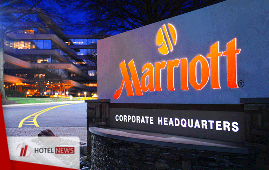
Hackers stole information on as many as 500 million guests of the Marriott hotel empire over four years, obtaining credit card and passport numbers and other personal data, the company said Friday as it acknowledged one of the largest security breaches in history. The full scope of the failure was not immediately clear. Marriott was trying to determine if the records included duplicates, such as a single person staying multiple times. The affected hotel brands were operated by Starwood before it was acquired by Marriott in 2016. They include W Hotels, St. Regis, Sheraton, Westin, Element, Aloft, The Luxury Collection, Le Méridien and Four Points. Starwood-branded timeshare properties were also affected. None of the Marriott-branded chains were threatened. The crisis quickly emerged as one of the biggest data breaches on record. "On a scale of 1 to 10 and up, this is one of those No. 10 size breaches. There have only been a few of them of this scale and scope in the last decade," said Chris Wysopal, chief technology officer of Veracode, a security company. By comparison, last year's Equifax hack affected more than 145 million people. A Target breach in 2013 affected more than 41 million payment card accounts and exposed contact information for more than 60 million customers. Security analysts were especially alarmed to learn that the breach began in 2014. While such failures often span months, four years is extreme, said Yonatan Striem-Amit, chief technology officer of Cybereason. It was unclear what hackers could do with the credit card information. Though it was stored in encrypted form, it was possible that hackers also obtained the two components needed to descramble the numbers, the company said. For as many as two-thirds of those affected, the exposed data could include mailing addresses, phone numbers, email addresses and passport numbers. Also included might be dates of birth, gender, reservation dates, arrival and departure times and Starwood Preferred Guest account information. "We fell short of what our guests deserve and what we expect of ourselves," CEO Arne Sorenson said in a statement. "We are doing everything we can to support our guests and using lessons learned to be better moving forward." The breach of personal information could put Marriott in violation of new European privacy laws, as guests included European travelers. Marriott set up a website and call center for customers who believe they are at risk. The hackers' access to the reservation system could be troubling if they turn out to be, say, nation-state spies rather than con artists simply seeking financial gain, said Jesse Varsalone, associate professor of cybersecurity at the University of Maryland University College. Reservation information could mean knowing when and where government officials are traveling, to military bases, conferences or other destinations abroad, he said. "There are just so many things you can extrapolate from people staying at hotels," Varsalone said. The richness of the data makes the hack unique, Wysopal said. "Once you know someone's arrival, departure, room preferences," that could be used to incriminate a person or for a reputation attack that "goes beyond your traditional identity theft or credit-card theft," he said. It isn't common for passport numbers to be part of a hack, but it is not unheard of. Hong Kong-based airline Cathay Pacific Airways said in October that 9.4 million passengers' information had been breached, including passport numbers. Passport numbers are often requested by hotels outside the U.S. because U.S. driver's licenses are not accepted there as identification. The numbers could be added to full sets of data about a person that bad actors sell on the black market, leading to identity theft. And while the credit card industry can cancel accounts and issue new cards within days, it is a much more difficult process, often steeped in government bureaucracy, to get a new passport.
Create: Dec 2, 2018 Edit: Dec 3, 2018 International News
The family real estate company once run by Jared Kushner is buying a hotel on the Lower East Side of Manhattan, the third hotel it has purchased this year. The Kushner Cos. said Tuesday that it is in contract to buy the 20-story Hotel on Rivington for an undisclosed amount. The company known for residential and office buildings bought two hotels in Long Branch, New Jersey, earlier this year. The company bought more than two-dozen apartment buildings in lower Manhattan when Jared Kushner was CEO. He stepped down from that position last year to become an adviser to his father-in-law, President Donald Trump. The Hotel on Rivington has a cocktail lounge and a three-story penthouse. A room with a king-size bed goes for more than $300 a night.
Create: Nov 27, 2018 Edit: Nov 27, 2018 International News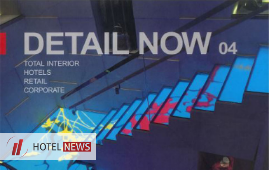
The Detail Now magazine is published in relation to the finest design of the hotel industry in China and is available in both Chinese and English, which is highly functional and operational. Customers and designers in the field of modern design and architecture can use the solutions and even plans designed in this publication. Detail Now Code:iranhotelnews.com
Create: Nov 15, 2018 Edit: Dec 29, 2022 International Magazines
Mr. Gabriel Escarrer Jaume, Executive Vice Chairman and CEO of Meliá Hotels International, the group’s Chief Operating Officer, Mr. André Gerondeau, and the Regional Vice President Asia Pacific, Mr. Bernardo Cabot, recently ended their Asia Pacific tour, during which they visited China, Thailand, Vietnam and Indonesia. During Mr. Escarrer’s trip, the company signed three new hotels: Meliá Hoi An and Meliá Phu Quoc in Vietnam, and Meliá Phuket Karon in Thailand. These new properties take Meliá Hotels International’s portfolio in Asia Pacific to 51 hotels, all scheduled to be fully operational by 2022. The company has seen spectacular growth over the last 6 years, growing from 6 operating hotels to 51 hotels in operation and pipeline. Since opening Meliá Bali in 1985, its first international hotel, Meliá has had a very strong focus on Asia, where it now has an extensive portfolio in 7 countries. In the medium term, the company expects that the growth of its Gran Meliá Hotels & Resorts, Meliá Hotels & Resorts, Sol by Meliá and INNSIDE by Meliá brands in the region may contribute to financial results and importance similar to that of their well-established and renowned Caribbean hotels. Furthermore, the company would like to bring other brands like ME by Meliá and Paradisus by Meliá from its portfolio to key destinations in APAC region. Over the last decade, the company has also focused heavily on China, a huge market in which it continues to make firm and consistent progress in increasing its hotel portfolio.
Create: Nov 13, 2018 Edit: Nov 18, 2018 International News
Hotel News - The head of the Cultural Heritage, Handicrafts and Tourism Organization of Iran, Dr. Ali Asghar Monesan, and UNWTO Secretary-General Zurab Pololikashvili, had a conference meeting today at noon at the Golestan Palace in Tehran. Secretary-General of the World Tourism Organization (UNWTO), in a gathering of journalists and media representatives, said: "The hospitality is one of the main components of the tourism industry, which is also important in Iran. On the other hand, Iran is a country that is rich in tourism and everyone should visit this country.” “Zurab Pololikashvili " said: Our presence and the presence of representatives from 27 countries around the world in Iran and the city of Hamedan are proofs that Iran has many tourist attractions. He added that these 27 countries can have 27 trade ties and so I am very happy that this event will be held tomorrow in Hamadan because it can be a new tourist destination apart from Tehran, Isfahan and Shiraz. We are here to help tourism in Iran and help tourism, develop and prosper.
Create: Nov 11, 2018 Edit: Nov 12, 2018 Regional News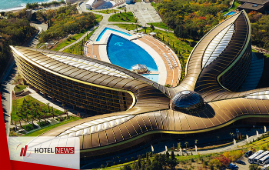
The latest US sanctions against Russia have hit four Crimean hotels, including Mriya Resort & Spa that is ranked as the world’s best holiday hotel and resort by the prestigious World Travel Awards. On Thursday, US Treasury department broadened the list of previously introduced Ukraine-related sanctions against Russia. The new list includes two Ukrainians, a Russian officer, and nine entities. The punitive measures were initially introduced in response to the reunification of the Crimean peninsula with Russia after a regional referendum in 2014. Washington had also accused Moscow of meddling with Ukrainian internal policy and fueling the conflict in eastern Ukraine. Russia’s Mriya Resort & Spa is located 25 kilometers from the Crimean city of Yalta. The complex was built with the financial support of Russia’s state-controlled lender Sberbank and is used to host the Yalta International Economic Forum. Russia’s Mriya Resort & Spa in #Crimea named the best holiday hotel The hotel was named the best holiday hotel and resort by the World Travel Awards in 2017. The year before, jury of the travel industry's most prestigious awards programme recognized Mriya Resort & Spa as Europe’s leading leisure resort. In 2015, Mriya won the title of Europe’s leading new resort. Established in 1923, World Travel aims to acknowledge, reward and celebrate excellence across all sectors of the tourism industry. The awards are decided by an open vote and have been described as 'the Oscars of the travel industry'. Earlier this month, the World Spa Awards ranked the Russian hotel third among the best spa resorts across the world. Mriya was topped only by the Dubai-based Armani SPA and the Iridium Spa located in the Maldives. Apart from Mriya Resort & Spa the US sanctions target the Ai-Petri health resort, the Dulber holiday resort, and the Resort Complex Miskhor – all located in Crimea and established by the companies working in the peninsula.
Create: Nov 10, 2018 Edit: Nov 10, 2018 International News
This Fourth Edition helps readers develop the wide-ranging knowledge and analytical skills they need to succeed in today’s burgeoning and dynamic hotel industry. This comprehensive volume encourages critical thinking by providing different points of view through contributions from sixty leading industry professionals and academics. Within a coherent theoretical structure, this updated edition enables readers to formulate their own ideas and solutions. Hotel Management and Operations Code: iranhotelnews.com
Create: Nov 2, 2018 Edit: Apr 15, 2019 International Books
Throughout decades of growth, contraction, swerves and surges, the bedrock of the multi-billion pound British foodservice industry has remained the community of equipment suppliers, prime importers, designers, specifiers and trade associations that collectively create the kitchens and counters that serve the nation . Now, for the first time, there will be a dedicated magazine and web site written specifically for this community of professionals. Catering Insight, which launches in January, will provide a unique opportunity for equipment manufacturers and prime importers to speak directly to the thousands of wholesalers, dealers and designers that specify what goes into most commercial kitchens . Catering Insight is the monthly business magazine and daily-updated web site for this vibrant and influential community of catering professionals, delivering vital news and analysis. Catering Insight Code: iranhotelnews.com
Create: Nov 2, 2018 Edit: Dec 29, 2022 International Magazines
